Related Research Articles

Murray Leinster was a pen name of William Fitzgerald Jenkins, an American writer of genre fiction, particularly of science fiction. He wrote and published more than 1,500 short stories and articles, 14 movie scripts, and hundreds of radio scripts and television plays.
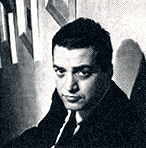
Alfred Bester was an American science fiction author, TV and radio scriptwriter, magazine editor and scripter for comic strips and comic books. He is best remembered for his science fiction, including The Demolished Man, winner of the inaugural Hugo Award in 1953.

Damon Francis Knight was an American science fiction author, editor, and critic. He is the author of "To Serve Man", a 1950 short story adapted for The Twilight Zone. He was married to fellow writer Kate Wilhelm.

Edmund Alexander Emshwiller was an American visual artist notable for his science fiction illustrations and his pioneering experimental films. He usually signed his illustrations as Emsh but sometimes used Ed Emsh, Ed Emsler, Willer and others.
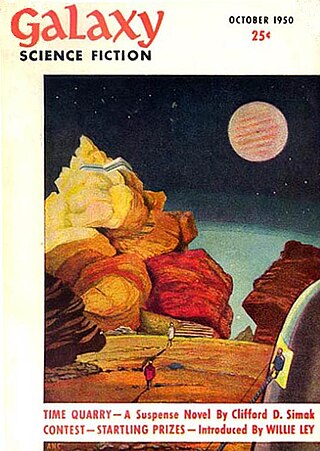
Galaxy Science Fiction was an American digest-size science fiction magazine, published in Boston from 1950 to 1980. It was founded by a French-Italian company, World Editions, which was looking to break into the American market. World Editions hired as editor H. L. Gold, who rapidly made Galaxy the leading science fiction magazine of its time, focusing on stories about social issues rather than technology.
Jacqueline Lichtenberg is an American science fiction author.

Judith Josephine Grossman, who took the pen-name Judith Merril around 1945, was an American and then Canadian science fiction writer, editor and political activist, and one of the first women to be widely influential in those roles.
Publication of comic strips and comic books focusing on science fiction became increasingly common during the early 1930s in newspapers published in the United States. They have since spread to many countries around the world.
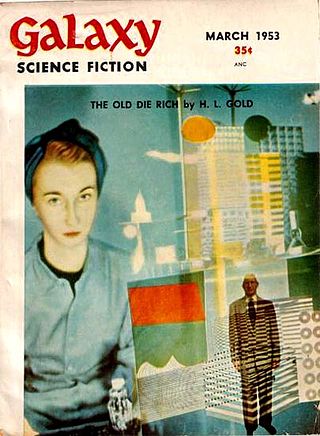
Horace Leonard Gold was an American science fiction writer and editor. Born in Canada, Gold moved to the United States at the age of two. He was most noted for bringing an innovative and fresh approach to science fiction while he was the editor of Galaxy Science Fiction, and also wrote briefly for DC Comics.
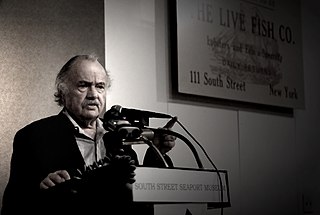
Ronald Joseph Goulart was an American popular culture historian and mystery, fantasy, and science fiction author.

William Anthony Parker White, better known by his pen name Anthony Boucher, was an American author, critic, and editor who wrote several classic mystery novels, short stories, science fiction, and radio dramas. Between 1942 and 1947, he acted as reviewer of mostly mystery fiction for the San Francisco Chronicle. In addition to "Anthony Boucher", White also employed the pseudonym "H. H. Holmes", which was the pseudonym of a late-19th-century American serial killer; Boucher would also write light verse and sign it "Herman W. Mudgett".

Zenna Chlarson Henderson was an American elementary school teacher and science fiction and fantasy author. Her first story was published in The Magazine of Fantasy & Science Fiction in 1951. Her work is cited as pre-feminist, often featuring middle-aged women, children, and their relationships, but with stereotyped gender roles. Many of her stories center around humanoid aliens called "The People", who have special powers. Henderson was nominated for a Hugo Award in 1959 for her novelette Captivity. Science fiction authors Lois McMaster Bujold, Orson Scott Card, Connie Willis, Dale Bailey, and Kathy Tyers have cited her as an influence on their work.

Margaret St. Clair was an American fantasy and science fiction writer, who also wrote under the pseudonyms Idris Seabright and Wilton Hazzard.

Alan Edward Nourse was an American science fiction writer and physician. He wrote both juvenile and adult science fiction, as well as nonfiction works about medicine and science. His SF works sometimes focused on medicine and/or psionics.

Edwin Charles Tubb was a British writer of science fiction, fantasy and western novels. The author of over 140 novels and 230 short stories and novellas, Tubb is best known for The Dumarest Saga, an epic science-fiction saga set in the far future. Michael Moorcock wrote, "His reputation for fast-moving and colourful SF writing is unmatched by anyone in Britain."
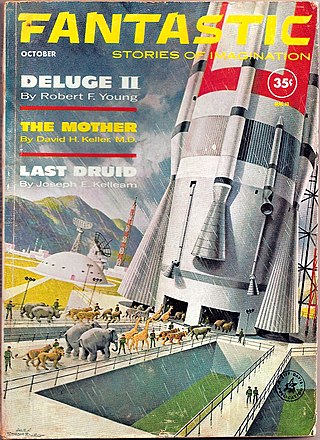
Fantastic was an American digest-size fantasy and science fiction magazine, published from 1952 to 1980. It was founded by the publishing company Ziff Davis as a fantasy companion to Amazing Stories. Early sales were good, and the company quickly decided to switch Amazing from pulp format to digest, and to cease publication of their other science fiction pulp, Fantastic Adventures. Within a few years sales fell, and Howard Browne, the editor, was forced to switch the focus to science fiction rather than fantasy. Browne lost interest in the magazine as a result and the magazine generally ran poor-quality fiction in the mid-1950s, under Browne and his successor, Paul W. Fairman.
Miriam Allen deFord was an American writer best known for her mysteries and science fiction. During the 1920s, she wrote for a number of left-wing magazines including The Masses, The Liberator, and the Federated Press Bulletin. Her short story, A Death in the Family, appeared on the second season, episode #2, segment one, of Night Gallery.

Earthman's Burden is a collection of science fiction stories by American writers Poul Anderson and Gordon R. Dickson. It was first published by Gnome Press in 1957. The story "Don Jones" was original to this collection. The other stories originally appeared in the magazines Other Worlds, Universe and Fantasy and Science Fiction.

Inez Haynes Irwin was an American feminist author, journalist, member of the National Women's Party, and president of the Authors Guild. Many of her works were published under her former name Inez Haynes Gillmore. She wrote over 40 books and was active in the suffragist movement in the early 1900s. Irwin was a "rebellious and daring woman", but referred to herself as "the most timid of created beings". She died at the age of 97.
References
- 1 2 Ann Warren Griffith, ISFDB.com
- ↑ The Women Pilots of World War II.
- ↑ Adam R. Seipp, Strangers in the Wild Place: Refugees, Americans, and a German Town, 1945-1952 (Indiana University Press 2013). ISBN 9780253007070
- ↑ Ann Warren Griffith, "Babes in the Wildflecken Woods" The New Yorker (October 28, 1950): 61.
- ↑ Ann Griffith, "The Magazines Women Read" The American Mercury (March 1949), anthologized in Nancy A. Walker, ed., Women's Magazines, 1940-1960: Gender Roles and the Popular Press (Spring 2016): 234-241. ISBN 9781137050687
- ↑ Henry Cavendish, "These May Have You Rolling in the Aisle" Chicago Tribune (November 16, 1958): 237. via Newspapers.com

- ↑ Ann Warren Griffith, "Subtle TV Ads Expected in '61" Janesville Daily Gazette (January 18, 1961): 24. via Newspapers.com

- ↑ Ann Griffith, "Zeritsky's Law" Galaxy Science Fiction (November 1951), at Project Gutenberg
 .
. - ↑ Ann Warren Griffith, "Captive Audience" The Magazine of Fantasy and Science Fiction (August 1953): 52-62.
- ↑ Charles R. Acland, Swift Viewing: The Popular Life of Subliminal Influence (Duke University Press 2012): 159. ISBN 9780822349198
- ↑ Lyman Tower Sargent, Utopian Literature in English: An Annotated Bibliography From 1516 to the Present (Penn State University Libraries).
- ↑ Ann Warren Griffith, Audience Captive (Le Passager Clandestin 2016). ISBN 9782369350491